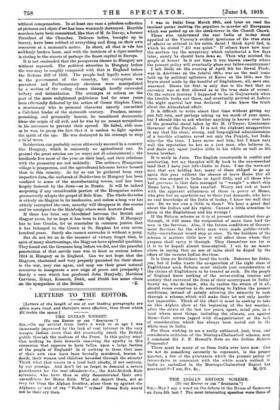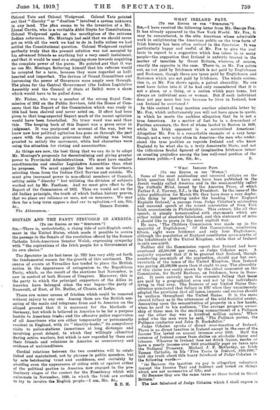Colonel Fate and Colonel Wedgwood. Colonel Tate pointed out that
" diarchy" or "dualism " involved a system unknown in any land. The plan seems to be the invention of a Mr. Lionel Curtis, who is a veritable Abbfi Sieybs for Constitutions. Colonel Wedgwood spoke as the mouthpiece of the extreme Indian reformers. Mr. Montagu had said that we should never get on with all the work we had to do in India unless we had settled the Constitutional question. Colonel Wedgwood replied perfectly truly that the present solution was not accepted by his advanced friends as anything but a very small instalment, and that it would be used as a stepping-stone towards acquiring the complete power of the puree. He pointed .ant that it was no use Mr. Montagu flattering himself that his reforms would be accepted for a term, because they were regarded as half- hearted and imperfect. The devices of Grand Committees and increasing the power of Governors were amply seen through. The plans for the Central Government (the Indian Legislative Assembly and the Council of State at Delhi) were a sham which would have to be pulled down.
Mr. Fisher, who was a member of the strong Royal Com- mission of 1912 on the Public Services, told the House of Com- mons that the Report of the Commission which was ready in 1914 had been shelved and never acted on. If effect had been given to that long-expected Report much of the recent agitation would have been forestalled. No truer word was said than this. The keeping back of this Report was a gross error in judgment. It was postponed on account of the war, but we know now how political agitation has gone on through the past years with the genuine grievance that nothing was being granted to satisfy the movement, while bad characters were using the situation for rioting and assassination.
As things are now, the best thing that we can do is to adopt Mr. Montagu's proposals for decentralizing and giving greater power to Provincial Administrations. We must have smaller constituencies and smaller Legislative Assemblies than what he proposes. We must appoint the best men as Governors, selecting them from the Indian Civil Service and outside. We must give increased power to non-official members of Council, setting aside "diarchy " but utilizing the division of subjects worked out by Mr. Feetham. And we must give effect to the Report of the Commission of 1912. Thus we would act on the old Indian principle, the truth of which Indian history proves. that we place our reliance on men, not on measures. We may then for a long term oppose a deaf ear to agitation.—I am, Sir,
The Athenaeum. •



































 Previous page
Previous page